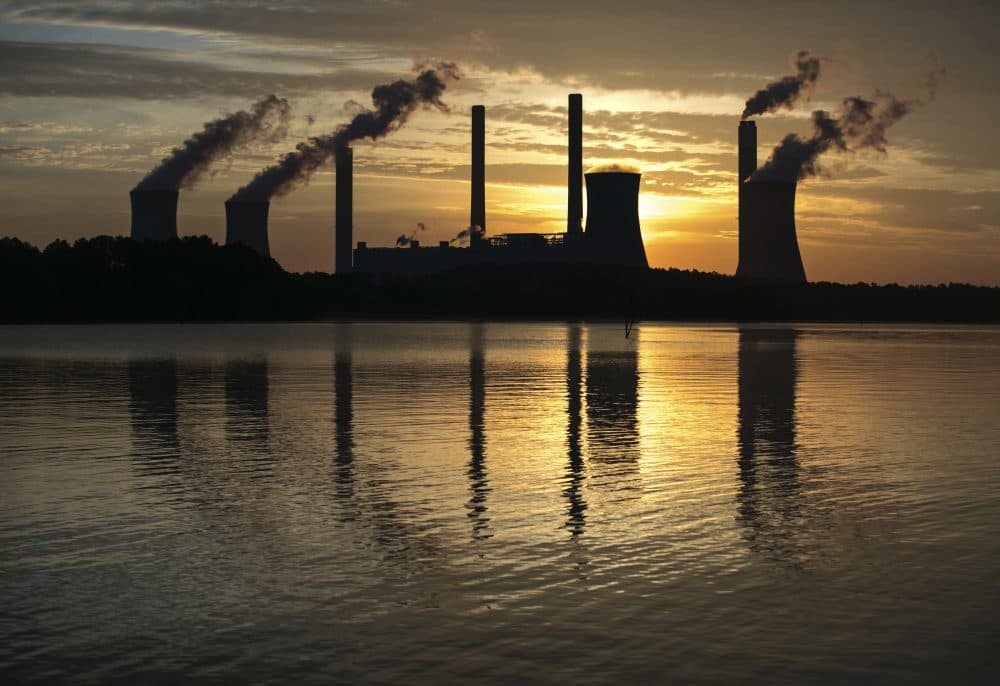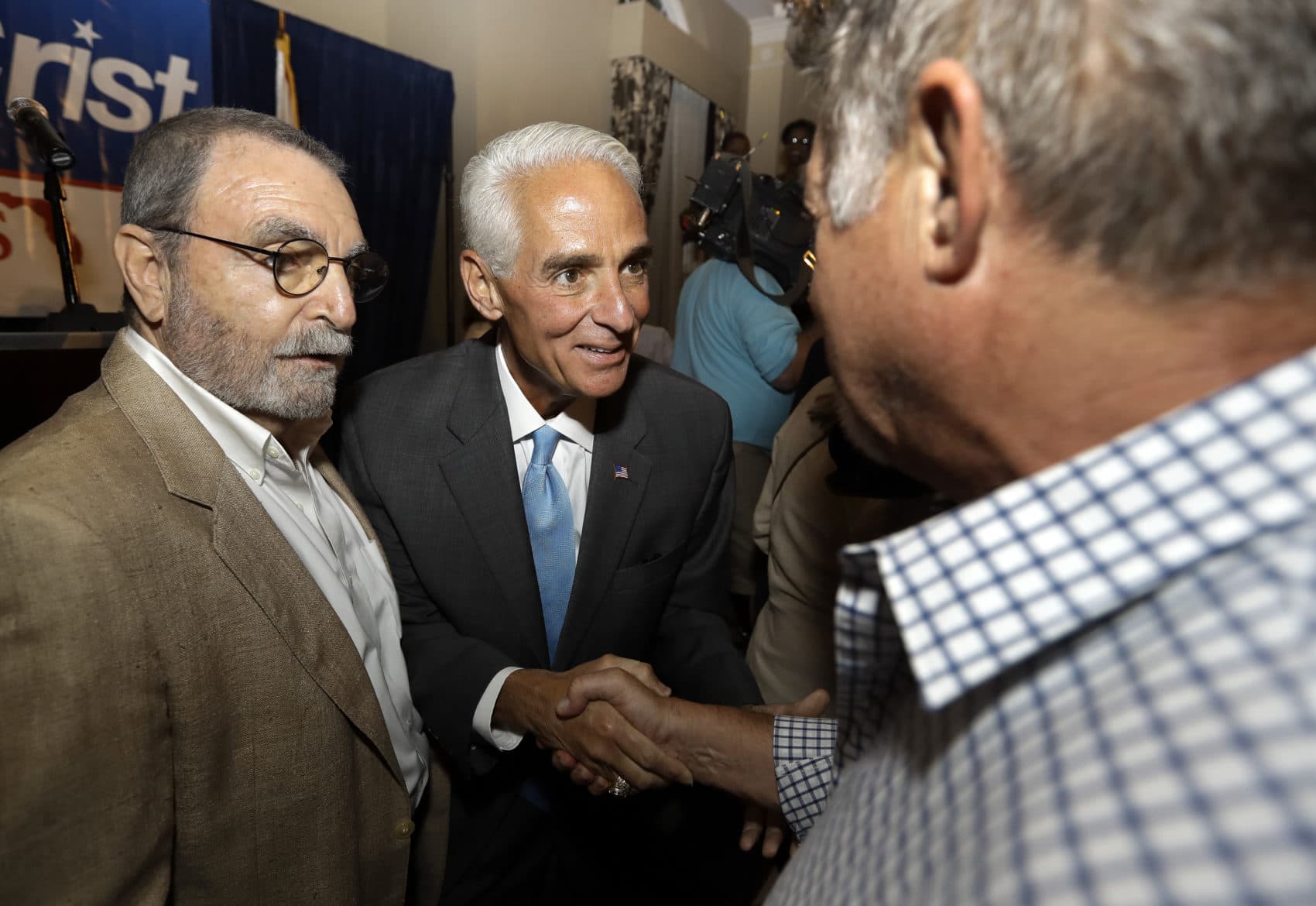Advertisement
Tackling Climate Change: The Fate Of A Carbon Tax In The U.S.
Resume
With Meghna Chakrabarti
A group of bipartisan legislators recently announced a bill that would tax fossil fuel companies for the carbon dioxide they emit.
Guests
Kate Yoder, news editor for Grist, an online environmentalist magazine. (@katemyoder)
Rep. Charlie Crist, Democratic representative of Florida’s 13th Congressional District. Co-sponsor of the bipartisan "Energy Innovation and Carbon Dividend Act." (@RepCharlieCrist)
Interview Highlights From Rep. Charlie Crist
On whether a carbon tax would translate to higher prices at the pumps
"I really don't think so. Obviously the purpose is to address climate change, and I think most of us can agree that it's a real and present danger. It's a problem that we in Florida see up close and personal, if you will. One good example of that would be the recent Hurricane Michael that hit Florida's Panhandle. It started out as a tropical storm wasn't expected to intensify much beyond that, and then as it came north in the Gulf of Mexico toward the Florida Panhandle, it intensified rapidly, almost to a Category 5. So we see evidence of this far too often. And then the recent wildfires in California, as well. And so the idea is to put a fee on those who create the utilization of carbon dioxide to the point that it's warming the planet, causing this problem, contributing to the destruction. And it hurts us environmentally, it hurts us economically, it hurts us in so many ways. The obvious intent is to curtail that kind of activity and the continued contribution of carbon dioxide.

"I think that you're looking at whether there's some kind of penalty that would exist. And I think the penalty here is that there is there is this fee — $15 for the initial year, then gets added to by $10 thereafter, as long as they are continuing to emit carbon. And the caller who asked the question becomes the beneficiary, because those funds go through the Department of Treasury and are remitted to the citizens of America, like your caller, like other consumers around the country. So in essence, I would argue that those people — the consumers like you and me and your caller from Wisconsin — will end up benefiting and not being penalized. This is really aimed at having the polluter pay and having the consumer gain, because through no fault of their own, these kinds of conditions are happening around the country."
On whether there's resistance to a carbon tax from both sides of the aisle
"We have bipartisan sponsors on this bill already. Initially there were three Democrats, two Republicans. Now we have three Republicans. So I think that the obvious nature of what's happening with climate change throughout America and the world, for that matter, is that people are seeing it, and the evidence of it is undeniable. And I think less and less you'll see people saying or touting the view that well it really doesn't exist, 'I don't believe it.' Because the weather indicators are so obvious and so clear that it's hard to refute. Just in Florida alone — I live in the Tampa Bay area and so I represent a district that happens to be a peninsula, Pinellas County. It's bordered on one side by Tampa Bay, the other side by the Gulf of Mexico. And I've lived there most of my life, but in the last five years, the rising sea level is apparent, it's obvious, you can see it with the naked eye and witness it. And another example down in Miami, Miami-Dade County, I think President Obama was down there are a number of years ago and giving a talk about this issue and said, here in Miami Dade County, you have situations where even when it's not raining, you're getting flooding, and that's because it's coming up.
"This new Congress that comes in in just a few weeks is going to be a bipartisan Congress, a Democratic House and a Republican Senate. What better time?"
Rep. Charlie Crist, D-Fla.
"And so the more Americans see this around the country, I think the more pressing and obvious this issue is and the greater the importance and support will become. And in this case, it's on a bipartisan basis. With three Republicans, three Democrats sponsoring this bill now in the House, obviously this new Congress that comes in in just a few weeks is going to be a bipartisan Congress, a Democratic House and a Republican Senate. What better time?"
From The Reading List
Grist: "This carbon tax is dead on arrival, but it shows bipartisanship is alive" — "For the first time in a decade, a bipartisan climate bill is on the table in Congress. The Energy Innovation and Carbon Dividend Act would institute a national carbon tax. If it passes (and that’s a giant if) the money would be returned to American households, meaning that each of us could get a nice check for about $500 each year.
"The bill was proposed last week by a collection of members of the U.S. House of Representatives from the bipartisan Climate Solutions Caucus. And it’s pretty ambitious for legislation with support from both sides of the aisle. If Congress passed the proposal next year, it would put the U.S. on track to outdo promises the Obama administration made as part of the Paris climate agreement, according to analysis from Noah Kaufman, an economist at Columbia University’s Center on Global Energy Policy.
"But again, please don’t hold your breath. Pigs will fly before the 2019 U.S. Senate passes a carbon tax and President Trump ('It’s cold! Whatever happened to Global Warming?') signs it into law. So if this legislation isn’t going anywhere, what’s the point of putting it out there?"
The Hill: "Bipartisan group of lawmakers propose landmark carbon tax" — "A bipartisan group of lawmakers is introducing a landmark bill that would charge fossil fuel companies a tax for their carbon dioxide emissions.
"The Energy Innovation and Carbon Dividend Act, announced by two Republicans and three Democratic members of the House on Tuesday, would charge $15 for each ton of carbon emitted into the air and would increase that fee by $10 every year afterward, in an effort to fight climate change. Other than administrative costs, all of the money would go back to taxpayers.
"Supporters say the bill would reduce greenhouse gas emissions by 40 percent in 10 years, and 91 percent by 2050. That’s a bigger cut than former President Obama’s Clean Power Plan or the United States’ commitment under the Paris climate agreement — a pact President Trump has promised to exit."
Politico: "Why greens are turning away from a carbon tax" — "Taxing carbon to tackle climate change is one of those big ideas that have long held a kind of bipartisan sway in Washington — endorsed by Al Gore and former members of Ronald Reagan’s Cabinet, economists from both parties and even Exxon Mobil.
"But environmentalists are increasingly ready to look elsewhere.
"This month's fuel-tax riots in Paris and the defeat of a carbon-fee ballot measure in Washington state show the difficulty of getting people to support a levy on the energy sources that heat their homes and power their cars. Meanwhile, even the most liberal Democratic candidates this year gave carbon taxes scant if any mention in their climate platforms, focusing instead on proposals like a phaseout of fossil fuels and massive investments in wind and solar power.
"The story of the carbon tax’s fading appeal, even among groups that like it in principle, shows the difficulties of crafting a politically palatable solution to one of the world’s most urgent problems — including greenhouse gas levels that are on track to reach a record high this year."
Anna Bauman produced this segment for broadcast.
This article was originally published on December 11, 2018.
This segment aired on December 12, 2018.